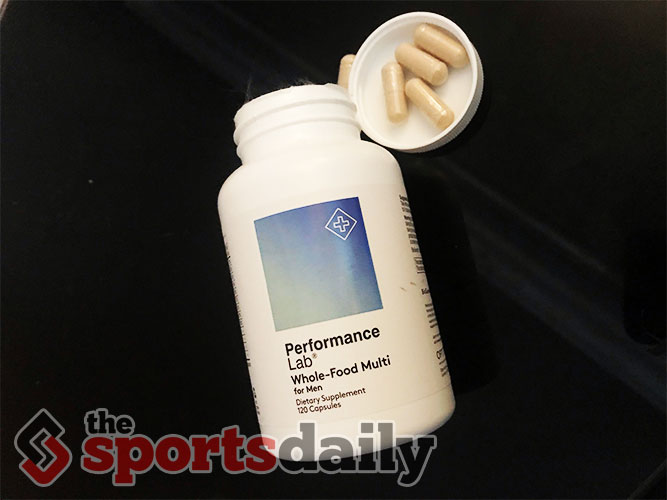Vitamins are more than just health supplements. They play an essential role in keeping our bodies alive and working – without them we couldn’t exist.
Ever since early humans discovered how to irrigate and grow crops, we’ve been attempting to produce as much food as possible in the shortest amount of time needed. Because of this, the crops we eat today have been gradually bred to our modern needs, BUT they now lack the same nutrients as thousands of years ago.
Although we now have a wider range of foods and drinks available to consume than ever before, getting the correct amount of daily vitamins seems to be getting harder and harder.
If you’re thinking of supplementing with a multivitamin, read our guide for what to look for and our recommendation for the best multivitamin to buy on the market today… Hint: It’s Performance Lab Whole-Food Multi, but more on that shortly.
Who Needs a Multivitamin?
Unless you follow an extremely healthy and varied diet (and possibly even then), you’re probably deficient in at least one vitamin or mineral and may benefit from taking a daily multivitamin supplement.
We ingest a large proportion of vitamins through the foods we eat. For example, a lot of store-bought pre-sliced bread is fortified – meaning essential minerals and vitamins like iron and folic acid have been added to the dough during the manufacturing process.
Not only that, many natural foods are packed full of vitamins too, fruit and vegetables being the classic examples. But this doesn’t mean that eating healthily will keep your vitamin-consumption at optimum levels – some vitamins are rare in nature. For example, Iodine is somewhat elusive in foods, so many people are prone to iodine deficiency.
The most common deficiency in America is caused by a lack of vitamin B6. Around 10% of the general population doesn’t regularly consume enough of this vital compound, leaving millions of people at risk of conditions such as depression, seizures and dermatitis. Although some foods may be fortified with B6, you might still be nowhere near achieving 100% of your daily recommended intake value.
Note, that there are eight types of B vitamin and the ideal multivitamin will contain all of these.
Another extremely prevalent health problem across the world is iron deficiency. It’s thought that 1 in 4 people are deficient in iron, a condition known as anemia.
Why is this bad? Well, a lack of iron in your diet can cause problems like excessive tiredness, rapid heart rate, muscle cramping and insomnia. It’s common knowledge that red meats like steak are one of the best sources of dietary iron – but this means that vegetarians and vegans are at an increased risk of anemia.
One other often left-out ingredient is inositol. Although it’s not a vitamin or mineral, inositol is used to regulate hormones, neurotransmitters and various human growth factors. It was previously known as vitamin B8, although scientists have since discovered that inositol is too unique to be included in the B family of vitamins.
Which Vitamins and Minerals Do I Need?
To cut a long story short, you need EVERY vitamin in your diet. However, you only need a trace amount of some minerals and vitamins, like Boron, as only a few chemical reactions in the body require it.
Vitamins that the human body requires can be split into two distinct categories – fat-soluble vitamins and water-soluble vitamins.
Common fat-soluble vitamins are vitamins A, D, E and K. They are stored inside the fatty tissues around our organs. Our bodies can’t produce these four vitamins, so they need to come from our foods, drinks or supplements.
Water-soluble vitamins dissolve in water meaning they are easily destroyed when washing foods and during cooking. A raw carrot is full of nutrients, but once boiled in a stew for a few hours, many of these nutrients are so broken down the body can’t use them. This is why taking a multivitamin is so important.
For Men:
Men need slightly more vitamin B1, Zinc and Boron. Vitamin B1 (also known as Thiamine) allows the body to convert carbohydrates (sugars) into energy. As men tend to have more muscle mass than women, they need slightly more energy and therefore will benefit from additional B1.
Boron is important in keeping testosterone levels high. As we age, testosterone levels may decrease leading to a multitude of embarrassing problems. Boron might also decrease estrogen levels, so you’ll be manlier for longer.
Zinc also aids the body in breaking down carbohydrates, but it plays a more significant role in keeping the immune system working and repairing damaged skin. Zinc isn’t just an obscure element; it’s a mineral that men and women need to absorb in small amounts. Only a trace amount is needed, so many multivitamins don’t include the exact amount as it’s so tiny. Zinc helps to maintain healthy bones and keep brain function high.

For Women:
Calcium is especially important for women. Because women are at an increased risk of developing osteoporosis, taking multivitamins containing calcium is a great way to help keep bones stronger and denser for longer. Post-menopausal women are at an even greater risk of bone problems, so dietary calcium supplements are even more important. Calcium is also used within the brain, nerves and the heart as it generates electrical signals (along with potassium). It’s worth noting that you need vitamin D to absorb calcium correctly.
On average, women also need a lot more Vitamin B9, otherwise known as folate or folic acid. This keeps DNA in tip-top condition and helps produce red blood cells as well as loads of other important processes. B9 also prevents neural tube defects in babies, so women who may become pregnant, or who already are pregnant, are advised by various American health organizations (including the American Pregnancy Institution) to keep their folate intake high.
Women also tend to need higher iron intake then men due to the iron lost when menstruating. This need decreases in post-menopausal women.
The different dietary needs of the genders should tell you one thing: when it comes to a multivitamin, you’re best choosing one that caters for your own physiology (i.e., male or female). It’s also worth selecting one that caters to your specific age group as well.
What to Look for in a Multivitamin
A good multivitamin should include a wide variety of vitamins and minerals, including the 13 essential vitamins:
A, C, D, E, K, B1, B2, B3, B5, B6, B7, B9 and B12.
It should also include the important minerals:
Calcium, Chromium, Copper, Iodine, Iron, Magnesium, Selenium, Zinc.
Bonus points for including rare elements like strontium. Strontium helps to keep bones strong while molybdenum aids the body in regulating metabolism.
Vitamin C should be found in every capsule to heal wounds, maintain teeth and bones and keep ligament, blood vessels and tendons healthy. Both of the K vitamins (K1 and K2) should be included. This allows the body to form blood clotting factors which are used to quickly stop bleeding. If you’re clumsy or especially prone to bleeding, vitamin K should help you out.
If you’re curious about how much of each vitamin men and women require each day, take a look at a products’ DV (daily recommended intake value). It’s most often found in a small table on the back of food products or supplements packaging.
The DV is calculated with the ‘average adult’ in mind. Although the DV is an excellent way to quickly see how nutritionally valuable a product is, it doesn’t give a precise amount for men and women. The DV doesn’t take bodyweight, age and height into account either. Every type of person requires a slightly different amount or ratio of vitamins.
A quality multivitamin should also come from a company with a good reputation and great customer support. If you have any questions, their website should answer them. Their delivery times should also be quick – nobody wants to wait weeks for their multivitamin to arrive!
Which Multivitamin is Best?
After researching the hundreds of multivitamins available in the U.S., we’ve found our favorite – Performance Lab Whole-Food Multi. It checks all of our boxes and contains everything a multivitamin should contain; loads of vitamins, lots of minerals and everything in the right amounts for men and women. We’re really impressed that it’s also organic and free from synthetic additives.
They’ve created two separate products, one targeted at men and the other at women. Each of these is slightly different because men and women need slightly different amounts of dietary supplements. Both products contain the same 28 vitamins, but in different amounts where relevant, depending on biological gender. Performance Lab Whole-Food Multi also contains vitamins that cheaper manufacturers tend to leave out, like strontium and molybdenum.
A unique feature of Performance Lab Whole-Food Multi is how the ingredients are sourced. Each capsule contains NutriGenesis™ Lactobacillus – a cultured nutrient that supplies probiotics to the stomach, keeping gut flora happy and healthy. The NutriGenesis™ method means that the vitamins and minerals found in Whole-Food Multi are identical to those found in nature, making them much easier to absorb than synthetic versions. The Lactobacillus bacteria are used to grow these supplements, just like in nature. This process of using bacteria to grow vitamins is eco-friendly and a cleaner process than traditional vitamin and mineral synthesis.
They’re all snugly packed into a small, easy-to-swallow Plantcaps® capsule made from Pullulan. Pullulan is a starch-free, vegan-friendly alternative to traditional tablet and capsule casings (like the multi-colored shell that most medicines and supplements come packaged in). It’s organic and considered as a prebiotic, dietary fiber too!
Also, Worth Noting…
Although the Whole-Food Multivitamins can be taken as a standalone multivitamin, they can also be combined with other health supplements for potentially greater results. Let’s take a nootropic like Mind Lab Pro for example. By itself, this product can produce a multitude of brain-boosting effects such as improved focus, enhanced mental clarity and faster muscle reaction times. However, it won’t provide all of the vitamins our bodies need to function. Likewise, taking a daily multivitamin for men or women should ensure the chemical processes within us are carried out at maximum efficiency by enzymes – but use it alongside Mind Lab Pro, or another nootropic such as Performance Lab Mind – and you boost the cognitive benefits even further.
Performance Lab Whole-Food Multi has been designed to be used safely in conjunction with any of the other supplement in the Performance Lab range.
If you follow an alternate lifestyle, by choice or for medical reasons, such as a gluten-free, soy-free or vegan-diet then you’re at increased risk of vitamin deficiency. Fortunately, Performance Lab Whole-Food Multi is free from any meat products, caffeine, synthetic additives, soy and gluten which is one of the many reasons why it’s our favorite multivitamin.
Opti-Nutra, the company that manufactures Whole Food-Multi, is a well-respected name when it comes to supplements. They have great customer support and will gladly answer any questions you might have regarding their products. Other, larger pharmaceutical and health companies often seem to care more about profits than people. That’s why we recommend you buy your multivitamin supplement from Opti-Nutra.
Performance Lab Whole-Food Multi is an excellent supplement choice and it’s worth paying slightly more than you would in a dollar store. This is a brilliant supplement, tailored for the modern consumer. If you’ve been looking for a top-quality multivitamin, look no further.
Add The Sports Daily to your Google News Feed!








